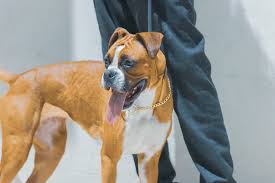If there was ever a breed that embodied goofiness, courage, and pure heart in one athletic body—it’s the Boxer. With their expressive eyes, muscular build, and playful spirit, Boxers are family favorites for a reason. Let’s dive into this fun-loving Boxer dog breed guide to see why they’re adored worldwide.
📚 Boxer Breed History and Origin
The Boxer breed history and origin traces back to 19th-century Germany. They were developed from the now-extinct Bullenbeisser (a Mastiff-type dog) and English Bulldogs. Initially bred for hunting and guarding, Boxers eventually became working dogs in police and military roles. Today, they’re loyal companions and fantastic family pets.
📏 Boxer Physical Features and Size
Boxers are medium to large-sized dogs, sleek and strong with a distinct square-shaped muzzle and alert posture.
- Height: 21.5–25 inches at the shoulder
- Weight: 55–70 lbs
- Coat: Short, shiny, and smooth
- Color: Fawn, brindle, and white (some have a black mask)
According to the Boxer AKC breed standard, their body should be well-proportioned and balanced, showcasing power and elegance with no bulkiness.
🎭 Boxer Dog Personality Traits
Living with a Boxer is like living with a toddler who never outgrows their play phase—and that’s part of the charm. Some key Boxer dog personality traits include:
- Playful and clownish: Always ready to entertain
- Loyal to the core: Fiercely devoted to their humans
- Alert and brave: Natural guardians
- Affectionate: Known to lean or “box” with their paws to get your attention
They thrive in environments where they feel like part of the pack (aka your family) and often do best when not left alone for long periods.
🧬 Boxer Dog Temperament
When it comes to Boxer dog temperament, these dogs are known for being:
- Friendly: Usually great with kids and even strangers
- Protective: Alert without being aggressive
- Energetic: They love walks, runs, and play sessions
Our Boxer, Bruno, used to patrol our backyard every morning like it was a mission. But once inside, he'd snuggle under the blanket like a lapdog—it’s this duality that makes them special.
💡 Boxer Dog Characteristics and Care
Here’s what you should know about caring for Boxers:
- Exercise: At least 1–2 hours daily
- Training: Positive reinforcement works best
- Socialization: Start early with people and pets
- Living Conditions: Best in homes with access to outdoor play, but adaptable to apartments with proper exercise
🍽️ Feeding Guidelines
Boxers need a balanced diet to support their active lifestyle and maintain muscle mass.
- Puppies: 3–4 meals/day with growth-formulated kibble
- Adults: 2 meals/day with lean protein and complex carbs
- Supplements: Omega-3s and joint support can be beneficial
🚫 Do’s and Don’ts
✅ Do’s
- Enroll in puppy training classes
- Brush their coat weekly to reduce shedding
- Schedule regular heart checks—Boxers can be prone to cardiomyopathy
❌ Don’ts
- Leave them outside unattended—they’re social butterflies
- Use harsh correction methods
- Overfeed—they can gain weight quickly if not active
🎁 Product Suggestions
- Interactive toys (like treat puzzles)
- Sturdy chew toys—they’re powerful chewers!
- Cooling mats for hot weather
- Elevated feeding bowls to support digestion
📌 Final Thoughts
Whether you’re drawn to their hilarious antics or their loyal guardian nature, Boxers make unforgettable companions. With proper care, training, and tons of playtime, these four-legged comedians will bring endless joy into your home. Just be ready for wiggle butts, flying paws, and lots of love.
Frequently Asked Questions (FAQs)
1. Are Boxer dogs good with children?
2. How much exercise does a Boxer need?
3. Do Boxer dogs drool a lot?
4. Are Boxers easy to train?
5. What are common health issues in Boxers?
6. Do Boxers get along with other pets?

About SniffnTail
SniffnTail is your go-to destination for everything pets. From helpful advice, tips, and insights to thoughtfully selected products and resources, we’re here to support pet owners at every stage of their journey. Whether you're caring for a playful pup, a wise old cat, or anything in between, SniffnTail offers tools and knowledge to make pet parenting easier and more joyful.
Related Articles
 Dog Breeds • 7 mins
Dog Breeds • 7 minsYorkshire Terrier Dog Breed Guide: Personality, Care & Lifestyle Tips
Explore the personality traits, training difficulty, grooming needs, and lifestyle compatibility of Yorkshire Terriers. Learn all about their temperament, exercise requirements, socialization needs, and more.
 Dog Breeds • 7 minutes
Dog Breeds • 7 minutesDachshund Dog Breed Guide: Personality, Care & Living Tips
Discover the unique personality traits, training needs, and care tips for Dachshunds. Learn all about their temperament, grooming needs, lifespan, and apartment suitability in this expert breed guide.
 Dog Breeds • 5 mins Read
Dog Breeds • 5 mins ReadPomeranian Breed Guide
The Pomeranian, often lovingly referred to as a “Pom,” is a small but bold member of the Spitz family. With their fox-like faces, thick double coats, and lively personalities, Pomeranians are a favorite among toy dog enthusiasts. Despite their petite size, these dogs have a big personality and a voice to match.

